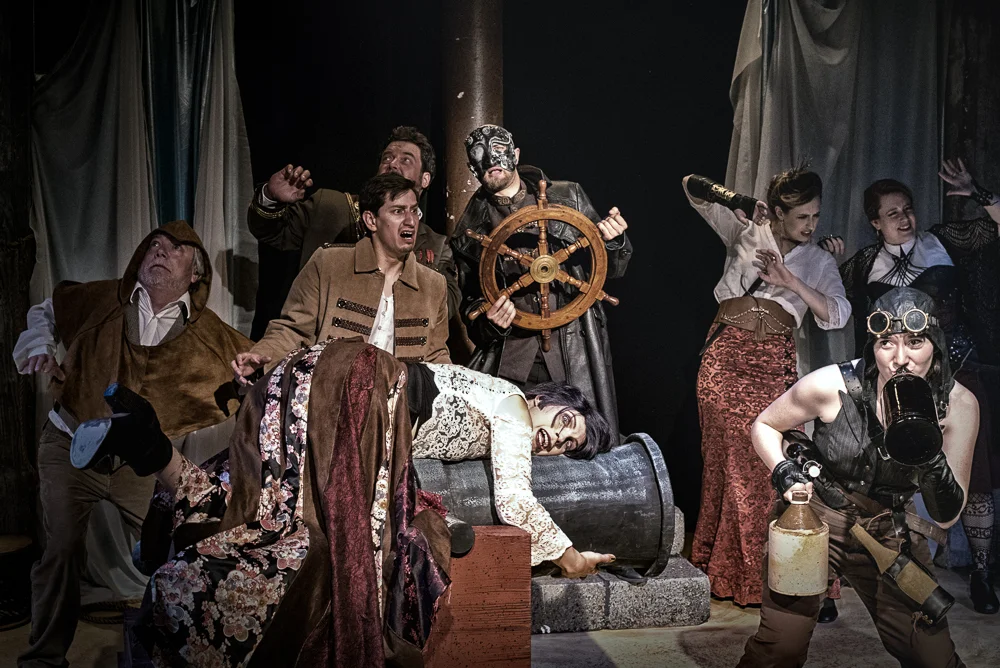Magic, Music, and The Tempest
By Doug Graham, Producing Artistic Director & Director of The Tempest
Roger Estrada as Ferdinand, Angelica Duncan-Basile as Miranda, Annie St. John as Prospero
The Tempest is the final show in our Season of Magic, our first official season in Seattle. The Tempest was the last complete play written by Shakespeare and is deceptively difficult to stage--Shakespeare actually wrote The Tempest to be performed in a closed air theatre such as the Blackfriers rather than his Globe (an open air theatre) because of the advanced technical elements. The Tempest is his most musical play, his most magical, and in my opinion one of his funniest.
In producing The Tempest we were immediately met with several glaring hurdles and challenges. Not the least of which is that it takes place on a beach. And before they even get to the beach we are aboard a boat that is caught in the middle of a terrible storm. In an ideal world we would be performing on a beautiful sandy beach, the rolling waves and a golden orange sunset as our backdrop. In reality, we are performing in a tiny converted theatre space in an old immigration building in the SoDo neighborhood of Seattle. How could we possibly bring this shipwreck and beach to life?
As an Original Practice Shakespeare Company, sometimes the best solution is the simplest one. Shakespeare’s company would have performed the play with minimal set and that is how we always approach our shows. We figure minimal sets worked for Shakespeare’s Company it’s good enough for us.
For me the solution was hide our limitations in plain sight. Prospero has so many speeches about acting and theatre, and even asks for the audience’s applause at the end of the play. Thus a concept was born. We will be a company of actors putting on a play and creating the world in which we live for our audience.
Like most Shakespearean comedies of the day, we chose to start the play with a song--in this case we chose a traditional druid song about the elements. This is not a song Shakespeare wrote, but I felt that it perfectly encapsulated the concept and the themes of the play. As the song goes along, members of the cast enter and begin to dress the set and the world of the beach begins to take shape. It leads directly into creating the storm where a group of individuals are tossed into a new and completely foreign land.
The island is a place of nature and magic. With four residents of the island, I decided to have them each represent an element. Prospero: Earth. In our production Prospero is played by a woman and she is representative of Mother Earth. She is the centerpiece of everything. She is constant and surefooted. She has complete control over her domain and the other residents of the island. Miranda: Fire. She is a young girl raised by a single parent on an island. She is passionate, extreme and the spirit of youth. Fire cannot be tamed. Caliban: Water. Often times throughout the play, he is referred to as a fish. Though water always finds a way, it is the easiest element to control, direct and contain. He wants desperately to be with Miranda, but sadly fire and water can never be. Ariel: Air. Ariel is a spirit that would be one with the elements, were it not for her servitude to Prospero. Ariel is the one that brings on the storm to wreck the ship. She is swift, playful, mischievous and unpredictable. And while often times we see Ariel played as a fairy in modern day productions, in Shakespeare’s time this is a character who would have been portrayed as an air demon.
So, What is the opposite of these elemental aspects? Science and technology. I decided to ask our costume designer to dress these stranded mariners in a steampunk design. After all, in the world of steampunk, their entire lives are governed by new technology.
Janet Holloway-Thomas as Trinculo, Jean E. Sleight as Stephano, Matt Gilworth as Caliban
I wanted to experiment with having two completely different worlds (one magical and elemental and one scientific/modern) meeting and reacting and interacting with each other. As these two worlds meet they begin to understand, embrace, respect and forgive. Not without difficulty and the occasional hilarious, drunken clown. We even witness the joining of the two worlds through the marriage.
As the play closes, the lights begin to come up and our cast takes the set away, leaving the actor playing Prospero alone. She is no longer Prospero, but an actor asking the audience for their love and support. Ultimately I believe that is what we all want in our lives. Whether we are in the theatre or another profession, we want approval for the work we do and love without condition for who we are. In this final moment of vulnerability, The Tempest helps bring these emotions to the forefront of my thoughts - I hope it does the same for you.
-Doug Graham




